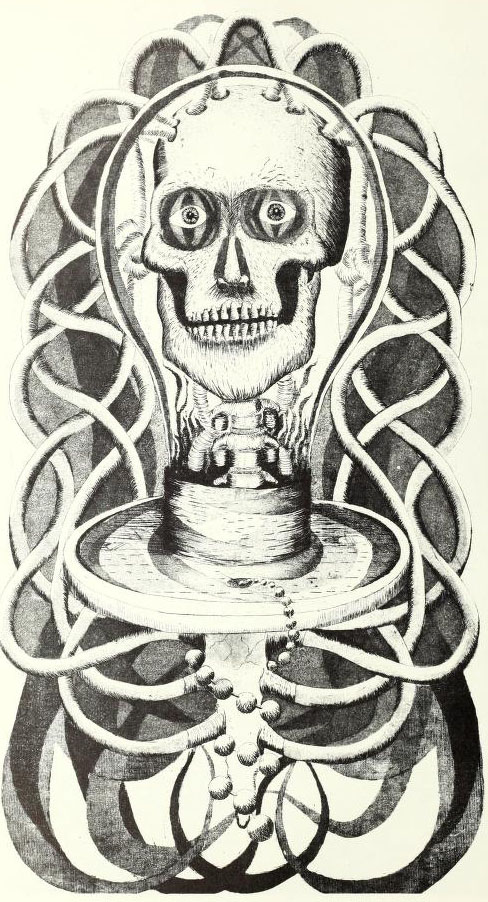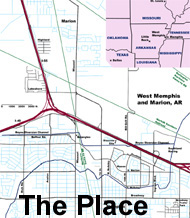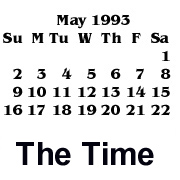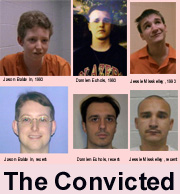Three or Four Days
Three Days
On Saturday, February 19, 1994, three days before the start of the jury selection for the Echols/Baldwin trial, a seemingly unrelated incident occurred: forty-one-year-old Gerald Arnold was accused of violating a four year old child. Unable to afford a lawyer, his younger, wealthy brother stepped in to help. Kent Arnold of Jonesboro, a real estate millionaire, hired attorney Lloyd Warford to represent his brother. Over the next week, Kent Arnold became part of the Echols/Baldwin jury and eventually its foreman. According to his attorney, during the trial proceedings he expressed his certainty of the defendant's guilt.
Lloyd Warford kept these conversations confidential until 2008, when he provided a sealed affidavit as part of the appeals. The statements were damning. Some were the general impressions of Warford.
Warford: "I also thought Kent would be struck [from being accepted on the jury] because he seemed to have made up his mind the defendants were guilty and he had a disdain for our justice system and the due process rights of defendants which he could hardly contain." [Lloyd Warford Affidavit, May 30, 2008]
Some were specific statements which Warford attributed to Kent Arnold.
"Soon after the trial started, Kent Arnold began complaining about how slow things were going. At one point, I remember him saying something to the effect that at least nine of us are ready to vote right now and asked why don't the prosecutors just play the confession and get this over with.... What was clear was that he thought the majority of the jury was ready to convict from virtually the beginning of the trial." [ibid]
"He then asked me how I would have convinced a jury on a case like this one when I was a prosecutor. I told him I could not help him with that, and he said what if I pay you to tell what I need to say to get this guy. Kent was laughing and joking when he said this but his clear message was he was determined to convince the other jurors to convict." [ibid]
These conversations continued after the trial and demonstrated an obsession with the confession which was explicitly forbidden from consideration by the jury.
"He was outraged that juries did not get all the evidence and went on and on about the jury in this case being denied the chance to hear the confession. Kent told me if the confession had not been mentioned in Court then he might not have been able to convince the swing jurors to convict." [ibid]
Kent Arnold, Jury Foreman
Voir Dire
Voir dire is part of the jury selection process. Those called to jury duty in the Echols/Baldwin trial were presented with a questionnaire and then the defense and prosecutors probed the prospective jury members for biases or anything that might make them unfit to meet their obligations. In an unusual maneuver, Judge Burnett held the voir dire proceedings in closed session, excluding the public and press.
According to Lloyd Warford's affidavit, Kent Arnold discussed the voir dire.
"I specifically questioned Kent about the voir dire and how he got on the jury. Kent stated he wanted to be on the jury, and he was not going to say anything that would get him struck from the jury unless he had to. Kent's strategy was not to answer a question that was not specific and addressed directly to him, at least not a question he thought would get him struck." [Lloyd Warford Affidavit, May 30, 2008]
Kent Arnold was questioned along with another prospective juror, Vicki Stoll. Near the beginning of the questioning, prosecutor Brent Davis makes it clear he knows Kent Arnold and refers to him by his first name.
Davis: Kent Arnold and Vicki Stoll, right?
Answer: Yes.
Davis: I know Kent. And, Ms. Stoll, my name is Brent Davis, and this is John Fogleman. The two of us will be representing the State of Arkansas in this particular matter. [Voir dire, Echols/Baldwin trial, February 24, 1994]
Arnold declared his belief in impartiality—along with a sense of impatience.
Davis: Mr. Arnold, if I was to ask you for the traits that you would look for in a good juror, what would your answer be?
Arnold: To be honest with you, I have never been around much law or lawyers or jurors or juries or trials, but I would assume it's a bunch of people that are relatively impartial to it. I mean, I just heard this over and over. I would assume that you would have to assume—and there is a law—that everybody is innocent until proven guilty. [ibid]
[In response to a question by Baldwin attorney, Ford:]
Arnold: Justice needs to hurry up. If this was a house I was building, we'd be in trouble. That's the only thing I've got to say. I don't know how much rights you give 'em. I think both of these guys are due due process, whatever that is, and they're—I don't know what the rights are set up. I think justice is slow. [ibid]
At least one of his answers suggested that he had already projected guilt and the punishment, i.e., he looked at the trial ahead as making decisions on both guilt and death penalty.
Ford: And can you assure me that you can separate Jason from Mr. Echols and only apply the evidence that actually goes in his pile and not take anything out of pile B and stick it over there and use that against him? Can you assure me that you won't do that?
Arnold: Me?
Ford: Yes.
Arnold: I think I can. Are there four decisions gonna come down here? One, two and then go back on death and death? Is there four different decisions this jury is gonna have to render?
Ford: If you find him innocent, no. [ibid]
And in this exchange, Arnold suggests guilt. In response to a question by Ford.
Arnold: I think it's your job to get this guy off...
Ford: It's my job is to get him off? Is that in any way infer or imply that he's done something to get off of—or as opposed of just being wrongfully accused? Do you have a preconceived starting...
Arnold: I'm sorry with these word semantics. [ibid]
Perhaps these red flags are only obvious in retrospection. Those conducting the voir dire declared:
Davis: Mr. Arnold is good for the state.
Ford: Good for Mr. Baldwin.
Price: Good for Mr. Echols. [ibid]
On the second day of the Echols/Baldwin trial, the Supreme Court of Arkansas ruled that Burnett erred in closing the proceedings. This ruling came without penalty or consequences.
The Supreme Court based Tuesday's ruling on past decisions, which strictly limit the discretion of judges to close jury selection.
"Members of the public, probably including members of a victim's family, have the right to hear the voir dire examination of individual jurors," the court ruled. "Cases have been reversed in this court because of answers given by prospective jurors which subsequent investigation established were false, or at least incorrect." [The Memphis Commercial Appeal, 3/2/94]
Four days
Kent Arnold was born on December 28, 1954. By being born before the new year, he began school with others born in 1954. If he had been born four days later, he would not only have been at the same high school as Brent Davis (born March 1955), he would have been a classmate. John N. Fogleman was born January 2, 1955.
Their educations criss-crossed.
1973. Kent Arnold graduated Jonesboro High School.
1974. Brent Davis graduated Jonesboro High School.
1974. John N. Fogleman graduated Marion High School. (Later attended by Damien Echols, Jason Baldwin and Jessie Misskelley.)
In 1976, Kent Arnold, John N. Fogleman, Charles Brent Davis attend Arkansas State University. In 1977 Arnold transfers to University of Arkansas.
1978. Kent Arnold graduated University of Arkansas in Fayetteville.
1978. Brent Davis and John N. Fogleman graduated Arkansas State University in Jonesboro. Fogleman majors in Physical Education.
1981. John N. Fogleman graduated with a law degree from University of Arkansas.
1982. Brent Davis graduated with a law degree from University of Arkansas.
Along with Fogleman, Davis and Arnold, jury member Peggy Roebuck is also pictured in the 1976 Arkansas State yearbook, in her case as a sponsor of the Missionary Baptist Student Fellowship.
While at the University of Arkansas Kent Arnold was a member of the Sigma Chi fraternity.
John N. Fogleman's father, two uncles, his brother and all five of his male first cousins were Sigma Chi members, in fact, every other male Fogleman for three generations - but not John N. Fogleman.
Gerald Arnold, Kent's brother and convicted sex offender, also attended the University of Arkansas and belonged to Sigma Chi.
Brent Davis (Lambda Chi Alpha), party animal, Arkansas Yearbook, 1976
A Death Threat and a Death Sentence
On the evening of Friday, March 18th, 1994, the day when the verdicts were delivered, attorneys Wadley and Davidson received a phone call from Misskelley attorney, Dan Stidham. They were informed:
Davidson: It is our understanding that one of the jurors, Ms. Sprinkle, was upset after leaving the court yesterday. That she went to her daughter and communicated to her daughter about being upset in the court. And also within that conversation told her daughter that one of the jurors— one of the other jurors whom we think is Kent Arnold—his daughter had received a death threat allegedly from one of Damien Echols' friends—the defendant—and that that information had been communicated to the jury at some point during their deliberations. And the daughter of the juror told that information to Dan Stidham's wife—from my understanding they're friends. And that from there that information was communicated to us. [transcript of hearing, March 19, 1994]
The next day, a hearing was held. The incident was summed up by Judge Burnett:
Burnett: When I arrived this morning, y'all were having a little conference and I came in to inquire about one of the technicalities with regard to sentencing and was informed at that time information had come to Mr. Davidson and Mr. Price that one of the jurors had received a death threat to a member of his family and in fact the juror was identified as the foreman and that his daughter allegedly had been threatened with death supposedly from some contact from Damien Echols and that that information was communicated during deliberation to other jurors. [ibid]
Burnett goes on to describe a call another juror, Dacus, received, a "crank call." The defense was not informed of its occurrence, nor would have been informed of Arnold's threat if it had not been for the unlikely meeting of the juror's daughter and Dan Stidham's wife.
Burnett called in Arnold for more information regarding his incident. Arnold characterized the threat to his daughter as not "directly" attributable to the defendants but did not provide an exact record of its nature.
Burnett: Have you or any member of your family, including perhaps a daughter, ever received a threat that could be attributable to the defendants in this case or anyone associated with them?
Arnold: Directly?
Burnett: Directly.
Arnold: No.
Burnett: Have—has even the indirect suggestion of that in any way affected your ability to be a fair minded juror in this case?
Arnold: No.
[snip]
Burnett: Was that discussed in the jury room—attributable to the defendants or anyone related—
Arnold: I discussed indirectly that I heard something—in the jury room?
Burnett: Yes.
Arnold: Yes.
Burnett: Was that before or after your verdict?
Arnold: Two weeks ago. [ibid]
This timeline does not jibe with Ms. Sprinkle being upset on the day of the verdicts.
Arnold went on to make clear that the threat was not discussed during deliberations.
Arnold: I think if—I think if anybody would be interested, the only thing that was discussed during deliberations was only facts in evidence that was delivered to us and nothing else. [ibid]
The lawyers for the defendants requested a mistrial which Burnett immediately denied. The penalty phase then proceeded. Including testimony from three witnesses, final arguments and jury deliberations it was concluded by mid-afternoon. Jason Baldwin was given life without parole and Damien Echols was sentenced to death.
After the sentences were pronounced, another hearing was held with the jury present. First Burnett spoke to Dacus regarding her phone call. Beginning with an admission that he made a mistake, Burnett polled the jury as a whole about the Dacus phone call—or else about his mistake or else about informing him about threats, his questioning was unclear.
Burnett: The Court erred in not reporting that to the—well, erred—I'm not sure that's the correct word. I made a mistake in not making a record of it at that time, putting it in the record that you [presumably Dacus] had said that to me and I had indicated to you if anybody tried to bother you in any way, I wanted to know about it. Do any of you have any different recollection of that?
Jury: No.
Burnett: Did that [unclear as to what "that" refers to] in anyway affect your deliberations in this case?
Jury: No.
Burnett: Did it in any way come up in the course of and in the discussion of this case in your deliberations?
Jury: No, sir.
Burnett: Did any other such contact, innuendo or threat, if you will, come up in your discussion of this case?
Jury: No, sir.
Burnett: Did any other subject matter of this nature not coupled with the evidence of this case arise during your deliberation whatsoever?
Jury: No, sir. [Post-sentencing hearing, March 19, 1994]
Burnett began to poll individual jurors as to whether their statements were truthful.
Burnett: I'm going to ask the clerk to call your names again and ask you to affirm that the questions I have just inquired of you are in fact your truthful answer. [ibid]
The question was confusing enough that Arnold asked him to clarify.
Arnold: I hate to say this, but what was the question again?
Burnett: The question is whether or not the subject matter of threats or threatening phone calls to the jury in any way affected your deliberations or was even discussed in your deliberations.
Arnold proceeded to answer half of his question.
Arnold: They were never discussed and never brought up in the deliberations. That's the truth. [ibid]
The defense was not satisfied with the polling.
Wadley: We specifically had requested the Court to inquire from the jury—and this request was made prior to the Court talking to the jury concerning this issue—that the jurors be questioned as to whether or not there was a discussion concerning a threat made to Kent Arnold's child at any time while the jurors were in service, and that request that the jurors be questioned about any conversations concerning threats made to the child or children be inquired by the Court as to what those discussions were and when they occurred.
It has been indicated they did not occur during deliberation, but it has also been indicated they occurred sometime during the trial, and we requested the Court to allow the Court to inquire from those jurors if in fact it had been discussed, when it was discussed, the nature of the discussions, the length of the discussions and that request was denied by the Court and we are requesting that that be allowed to be done. [ibid]
In contrast to Kent Arnold's statements, Burnett seemed to believe Arnold had discussed the phone call Ms. Dacus received with the jury.
Burnett: He [Kent Arnold] further indicated that it occurred two weeks before and it was about a ten second conversation and what he made reference to I'm quite certain was Ms. Dacus' statement that she had received a harassing type phone call. [ibid]
The defense protested.
Wadley: The Dacus deal and the Arnold deal are two separate situations. [ibid]
Burnett ended the hearing by saying:
Burnett: You can appeal it all day long. Your record is made. [ibid]

Artwork presented across from the introductory page of the 1976 Arkansas State Yearbook.








![]()
![]()